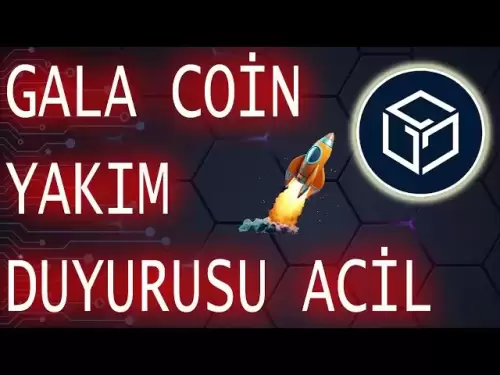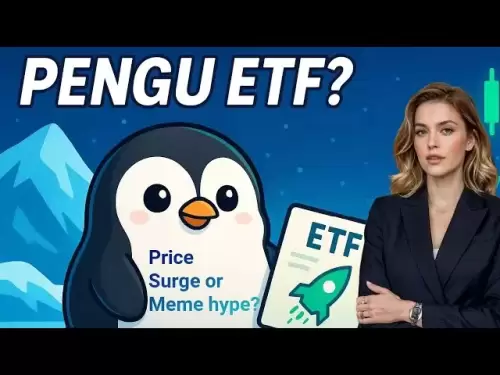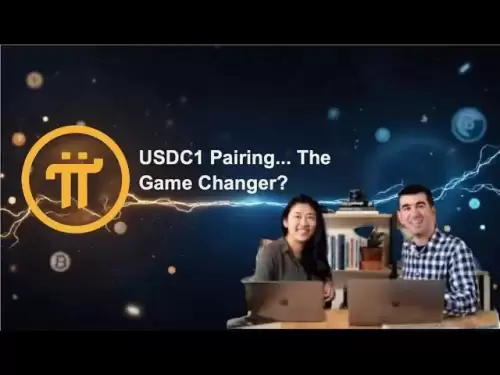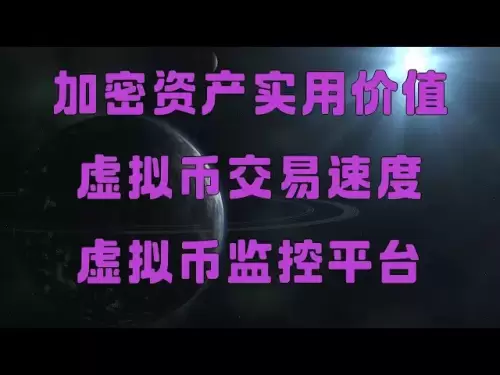-
 Bitcoin
Bitcoin $106,731.2224
-1.05% -
 Ethereum
Ethereum $2,444.9804
-1.20% -
 Tether USDt
Tether USDt $1.0003
0.01% -
 XRP
XRP $2.1882
0.09% -
 BNB
BNB $651.1435
-0.61% -
 Solana
Solana $148.3252
-2.09% -
 USDC
USDC $1.0000
0.01% -
 TRON
TRON $0.2787
0.55% -
 Dogecoin
Dogecoin $0.1598
-3.16% -
 Cardano
Cardano $0.5520
-2.43% -
 Hyperliquid
Hyperliquid $39.0960
-2.64% -
 Bitcoin Cash
Bitcoin Cash $516.9519
2.98% -
 Sui
Sui $2.7011
-2.95% -
 Chainlink
Chainlink $13.0582
-1.71% -
 UNUS SED LEO
UNUS SED LEO $8.9250
-2.53% -
 Stellar
Stellar $0.2359
-0.18% -
 Avalanche
Avalanche $17.3856
-3.73% -
 Toncoin
Toncoin $2.8095
-3.56% -
 Shiba Inu
Shiba Inu $0.0...01121
-1.95% -
 Litecoin
Litecoin $85.2795
-0.85% -
 Hedera
Hedera $0.1471
-2.15% -
 Monero
Monero $319.8004
1.12% -
 Dai
Dai $1.0001
0.01% -
 Ethena USDe
Ethena USDe $1.0001
0.02% -
 Bitget Token
Bitget Token $4.5344
-1.07% -
 Polkadot
Polkadot $3.3224
-2.96% -
 Uniswap
Uniswap $6.9697
-2.75% -
 Aave
Aave $266.1658
-2.25% -
 Pepe
Pepe $0.0...09414
-3.41% -
 Pi
Pi $0.4913
-3.29%
What mistakes do new ONDO traders often make, how to avoid them
New ONDO traders often err by not researching, ignoring risk management, overtrading emotionally, falling for scams, not using tools, and neglecting records.
May 03, 2025 at 11:35 am
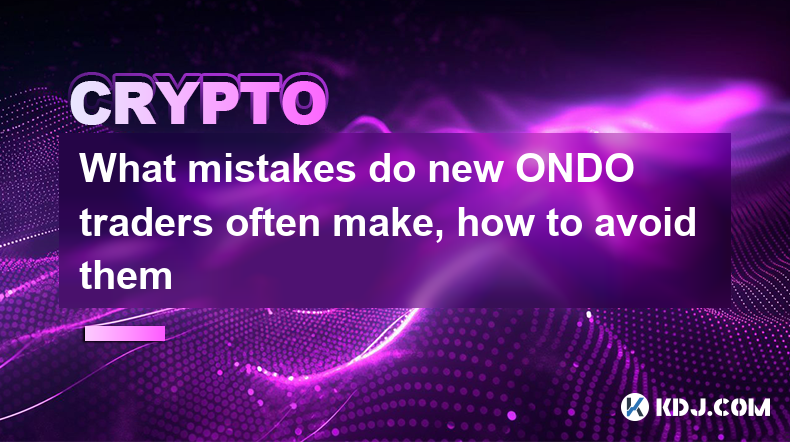
New traders entering the world of ONDO, a decentralized finance (DeFi) token, often make several common mistakes that can lead to losses or missed opportunities. Understanding these pitfalls and learning how to avoid them is crucial for anyone looking to navigate the volatile crypto markets effectively. In this article, we will explore the most frequent errors made by new ONDO traders and provide practical advice on how to sidestep these issues.
Lack of Research and Understanding
One of the most critical mistakes new ONDO traders make is diving into trading without a thorough understanding of the token and the broader DeFi ecosystem. ONDO is a token that operates within the DeFi space, often used for lending, borrowing, and other financial services on the blockchain. Without understanding the fundamentals of how ONDO functions, its use cases, and the risks involved, traders are more likely to make uninformed decisions.
To avoid this mistake, new traders should dedicate time to research. This includes studying the whitepaper of ONDO, understanding its tokenomics, and staying updated with the latest developments in the DeFi sector. Engaging with online communities, forums, and social media channels dedicated to ONDO can also provide valuable insights and help build a more comprehensive understanding of the token's ecosystem.
Ignoring Risk Management
Another common error among new ONDO traders is neglecting proper risk management. The crypto market, including ONDO, is known for its high volatility, which can lead to significant gains but also substantial losses. Many new traders enter the market with a 'get rich quick' mentality, often risking more than they can afford to lose.
To mitigate this risk, traders should implement a solid risk management strategy. This can include setting stop-loss orders to limit potential losses, diversifying their portfolio to spread risk, and only investing money that they can afford to lose. It's also crucial to set realistic expectations and not to be swayed by the fear of missing out (FOMO) on potential gains.
Overtrading and Emotional Trading
Overtrading and emotional trading are significant pitfalls for new ONDO traders. The excitement of the crypto market can lead traders to make frequent trades, often driven by emotions rather than a well-thought-out strategy. This can result in high transaction fees and poor decision-making, ultimately leading to losses.
To avoid overtrading, traders should develop a trading plan and stick to it. This plan should outline clear entry and exit points, as well as the rationale behind each trade. Additionally, taking breaks from trading and not letting emotions dictate decisions can help maintain a disciplined approach. Tools like trading journals can also be useful in tracking performance and identifying patterns in trading behavior.
Falling for Scams and Phishing Attacks
The crypto space is rife with scams and phishing attacks, and new ONDO traders are particularly vulnerable. Scammers often target new entrants with promises of high returns or by posing as legitimate projects. Phishing attacks can lead to the loss of funds if traders unknowingly provide their private keys or other sensitive information.
To protect against these threats, traders should be vigilant and cautious. Always verify the authenticity of any project or platform before investing. Use official channels to access websites and never share private keys or sensitive information. Additionally, enabling two-factor authentication (2FA) on all trading platforms and wallets can add an extra layer of security.
Not Using Proper Trading Tools
Many new ONDO traders overlook the importance of using proper trading tools. These tools can provide valuable data and insights that can enhance trading decisions. Without them, traders may miss out on critical market trends and technical indicators that could inform their strategies.
To improve their trading, new traders should familiarize themselves with various trading tools. This can include technical analysis software, charting platforms, and market analysis tools. Learning how to use these tools effectively can help traders make more informed decisions and stay ahead of market movements.
Neglecting to Keep Records
Another mistake often made by new ONDO traders is neglecting to keep detailed records of their trades. Without proper documentation, it can be challenging to track performance, identify successful strategies, and learn from past mistakes. This can lead to a lack of accountability and hinder long-term growth as a trader.
To avoid this, traders should maintain a trading journal. This journal should include details of each trade, such as entry and exit points, the rationale behind the trade, and the outcome. Regularly reviewing this journal can help traders identify patterns, refine their strategies, and improve their overall performance.
FAQs
Q: How can I stay updated with the latest ONDO developments?
A: To stay updated with the latest ONDO developments, you can follow the official ONDO social media channels, join relevant Telegram groups or Discord servers, and subscribe to newsletters from reputable crypto news sources. Engaging with the ONDO community can also provide real-time updates and insights.
Q: What are some reliable sources for learning about ONDO and DeFi?
A: Reliable sources for learning about ONDO and DeFi include the official ONDO documentation and whitepaper, educational content from platforms like CoinMarketCap and CoinGecko, and reputable DeFi-focused blogs and YouTube channels. Additionally, online courses and webinars from established crypto educators can provide structured learning opportunities.
Q: How can I protect my ONDO investments from market volatility?
A: To protect your ONDO investments from market volatility, consider implementing a diversified investment strategy, using stop-loss orders to limit potential losses, and regularly rebalancing your portfolio. Additionally, staying informed about market trends and economic indicators can help you make more informed decisions and adjust your strategy accordingly.
Q: What are some common red flags to watch out for when investing in ONDO projects?
A: Common red flags to watch out for when investing in ONDO projects include promises of guaranteed high returns, lack of transparency in the project's whitepaper or team, and aggressive marketing tactics. Be cautious of projects that ask for sensitive information or private keys, and always verify the legitimacy of the project through official channels and community feedback.
Disclaimer:info@kdj.com
The information provided is not trading advice. kdj.com does not assume any responsibility for any investments made based on the information provided in this article. Cryptocurrencies are highly volatile and it is highly recommended that you invest with caution after thorough research!
If you believe that the content used on this website infringes your copyright, please contact us immediately (info@kdj.com) and we will delete it promptly.
- Powell, Stablecoin Regulation, and Circle's Bold Move: A New York Minute on Crypto's Future
- 2025-07-02 02:30:12
- Ethereum Price, Tom Lee, and Bitcoin: A New Era for Crypto?
- 2025-07-02 02:30:12
- Hoskinson, Ripple, Cardano DeFi: A New Era of Collaboration?
- 2025-07-02 02:35:12
- BlockDAG, ALGO, and the Crypto Trends Shaping 2025
- 2025-07-02 01:50:12
- Cold Wallet, Token, Gains: Is CWT the Smartest Crypto Move?
- 2025-07-02 01:10:12
- Pi Coin's Rocky Ride: Support Levels, Recovery Timeline, and What the Experts Are Saying
- 2025-07-02 01:10:12
Related knowledge

How to customize USDT TRC20 mining fees? Flexible adjustment tutorial
Jun 13,2025 at 01:42am
Understanding USDT TRC20 Mining FeesMining fees on the TRON (TRC20) network are essential for processing transactions. Unlike Bitcoin or Ethereum, where miners directly validate transactions, TRON uses a delegated proof-of-stake (DPoS) mechanism. However, users still need to pay bandwidth and energy fees, which are collectively referred to as 'mining fe...

USDT TRC20 transaction is stuck? Solution summary
Jun 14,2025 at 11:15pm
Understanding USDT TRC20 TransactionsWhen users mention that a USDT TRC20 transaction is stuck, they typically refer to a situation where the transfer of Tether (USDT) on the TRON blockchain has not been confirmed for an extended period. This issue may arise due to various reasons such as network congestion, insufficient transaction fees, or wallet-rela...

How to cancel USDT TRC20 unconfirmed transactions? Operation guide
Jun 13,2025 at 11:01pm
Understanding USDT TRC20 Unconfirmed TransactionsWhen dealing with USDT TRC20 transactions, it’s crucial to understand what an unconfirmed transaction means. An unconfirmed transaction is one that has been broadcasted to the blockchain network but hasn’t yet been included in a block. This typically occurs due to low transaction fees or network congestio...

How to check USDT TRC20 balance? Introduction to multiple query methods
Jun 21,2025 at 02:42am
Understanding USDT TRC20 and Its ImportanceUSDT (Tether) is one of the most widely used stablecoins in the cryptocurrency market. It exists on multiple blockchain networks, including TRC20, which operates on the Tron (TRX) network. Checking your USDT TRC20 balance accurately is crucial for users who hold or transact with this asset. Whether you're sendi...

What to do if USDT TRC20 transfers are congested? Speed up trading skills
Jun 13,2025 at 09:56am
Understanding USDT TRC20 Transfer CongestionWhen transferring USDT TRC20, users may occasionally experience delays or congestion. This typically occurs due to network overload on the TRON blockchain, which hosts the TRC20 version of Tether. Unlike the ERC20 variant (which runs on Ethereum), TRC20 transactions are generally faster and cheaper, but during...

The relationship between USDT TRC20 and TRON chain: technical background analysis
Jun 12,2025 at 01:28pm
What is USDT TRC20?USDT TRC20 refers to the Tether (USDT) token issued on the TRON blockchain using the TRC-20 standard. Unlike the more commonly known ERC-20 version of USDT (which runs on Ethereum), the TRC-20 variant leverages the TRON network's infrastructure for faster and cheaper transactions. The emergence of this version came as part of Tether’s...

How to customize USDT TRC20 mining fees? Flexible adjustment tutorial
Jun 13,2025 at 01:42am
Understanding USDT TRC20 Mining FeesMining fees on the TRON (TRC20) network are essential for processing transactions. Unlike Bitcoin or Ethereum, where miners directly validate transactions, TRON uses a delegated proof-of-stake (DPoS) mechanism. However, users still need to pay bandwidth and energy fees, which are collectively referred to as 'mining fe...

USDT TRC20 transaction is stuck? Solution summary
Jun 14,2025 at 11:15pm
Understanding USDT TRC20 TransactionsWhen users mention that a USDT TRC20 transaction is stuck, they typically refer to a situation where the transfer of Tether (USDT) on the TRON blockchain has not been confirmed for an extended period. This issue may arise due to various reasons such as network congestion, insufficient transaction fees, or wallet-rela...

How to cancel USDT TRC20 unconfirmed transactions? Operation guide
Jun 13,2025 at 11:01pm
Understanding USDT TRC20 Unconfirmed TransactionsWhen dealing with USDT TRC20 transactions, it’s crucial to understand what an unconfirmed transaction means. An unconfirmed transaction is one that has been broadcasted to the blockchain network but hasn’t yet been included in a block. This typically occurs due to low transaction fees or network congestio...

How to check USDT TRC20 balance? Introduction to multiple query methods
Jun 21,2025 at 02:42am
Understanding USDT TRC20 and Its ImportanceUSDT (Tether) is one of the most widely used stablecoins in the cryptocurrency market. It exists on multiple blockchain networks, including TRC20, which operates on the Tron (TRX) network. Checking your USDT TRC20 balance accurately is crucial for users who hold or transact with this asset. Whether you're sendi...

What to do if USDT TRC20 transfers are congested? Speed up trading skills
Jun 13,2025 at 09:56am
Understanding USDT TRC20 Transfer CongestionWhen transferring USDT TRC20, users may occasionally experience delays or congestion. This typically occurs due to network overload on the TRON blockchain, which hosts the TRC20 version of Tether. Unlike the ERC20 variant (which runs on Ethereum), TRC20 transactions are generally faster and cheaper, but during...

The relationship between USDT TRC20 and TRON chain: technical background analysis
Jun 12,2025 at 01:28pm
What is USDT TRC20?USDT TRC20 refers to the Tether (USDT) token issued on the TRON blockchain using the TRC-20 standard. Unlike the more commonly known ERC-20 version of USDT (which runs on Ethereum), the TRC-20 variant leverages the TRON network's infrastructure for faster and cheaper transactions. The emergence of this version came as part of Tether’s...
See all articles





















